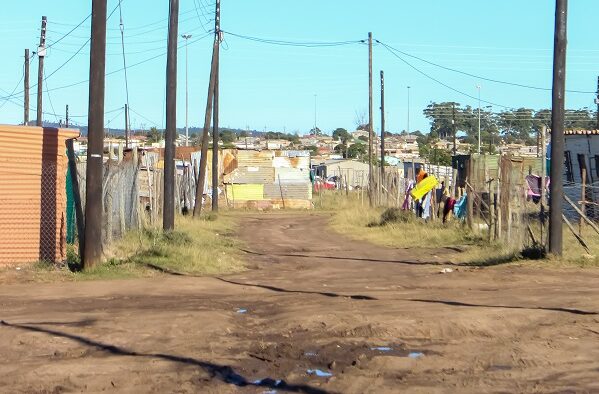By Sisipho Pinyana and Fahdia Msaka
eNkanini is an informal settlement in Makhanda that was formed in 2017, where the community is about to enter another winter with residents still facing undesirable living situations in shacks. The residents recently obtained electricity in 2022, after five years of protest which demanded the attention of the Makana municipality. Since then, their quest for houses has not gone anywhere – residents of eNkanini said the last interaction they had with the municipality was “when we were fighting for electricity”.
The undesirable living situation for residents in eNkanini will be intensified during the winter season, which is sure to amplify the anguish of living in and with poor infrastructure. For example, eNkanini residents still resort to gathering to wood to light fires outside to keep warm. They also face unbearable water, sanitation and hygiene issues (no toilets) which will lead to physical, mental, and emotional health issues. “We don’t have schools around so the kids have to walk far distances to schools every morning, even to creches”, said a resident of eNkanini, who preferred not to give her name.
Zwelidinga Ralo, a resident of eNkanini and the only one willing to be named, said: “The unemployment rate is high here and most people live off piece jobs”. These high unemployment rates lead to crime which is intensified during load shedding hours, he added, also mentioning that residents sometimes have to walk long distances to collect wood to make fires.
Zwelidinga Ralo at his home. Photo: Fahdia Msaka.
Out of the many issues faced by eNkanini residents, the final blow is the water and sanitation issue. “The municipality used to bring water to us twice a month to fill our tanks but they don’t come anymore and we have to collect water from the Pitsini”, residents told Grocott’s Mail.
They explained that the “Pitsini” is located close to Phola Park, and is similar to a spring. This is an alternative method of getting water when the municipality does not show up with water trucks. “At the Pitsini kids play and urinate in that water as well,” said another resident of eNkanini. Therefore, the community cannot use the water for drinking – they only use the water for washing and cleaning purposes, and still struggle to access drinking and cooking water.
Residents said they shared concerns about getting sick from the cold. One spoke out about their collective health and the condition of the environment they are living in. She said, “roads here are not great, which costs people lives. In some cases, people die before they can even get help because the ambulance refuses to come in at eNkanini. The ambulances complain about the issue of the road and we have to wait at Joza, or the ambulance doesn’t even pitch at all,” said the resident.
Some of the people that Grocott’s Mail interviewed said, sadly, that there were even elderly people living alone in shacks who were suffering intensely, because they had no way to collect water on their own and sometimes had to pay others to bring water to them.
The residents all agreed that they have been promised houses for quite some time, and yet they are still living in shacks made of iron, or in homemade houses built from mud and sticks.
“Still now, there are no houses that have been built in the area. Some get those prefabricated temporary houses if they are victims of fire, but even those temporary houses are not stable enough to keep a family warm,” said a resident of eNkanini, adding that the flimsy, temporary rooms seem to have become permanent homes in the area.


